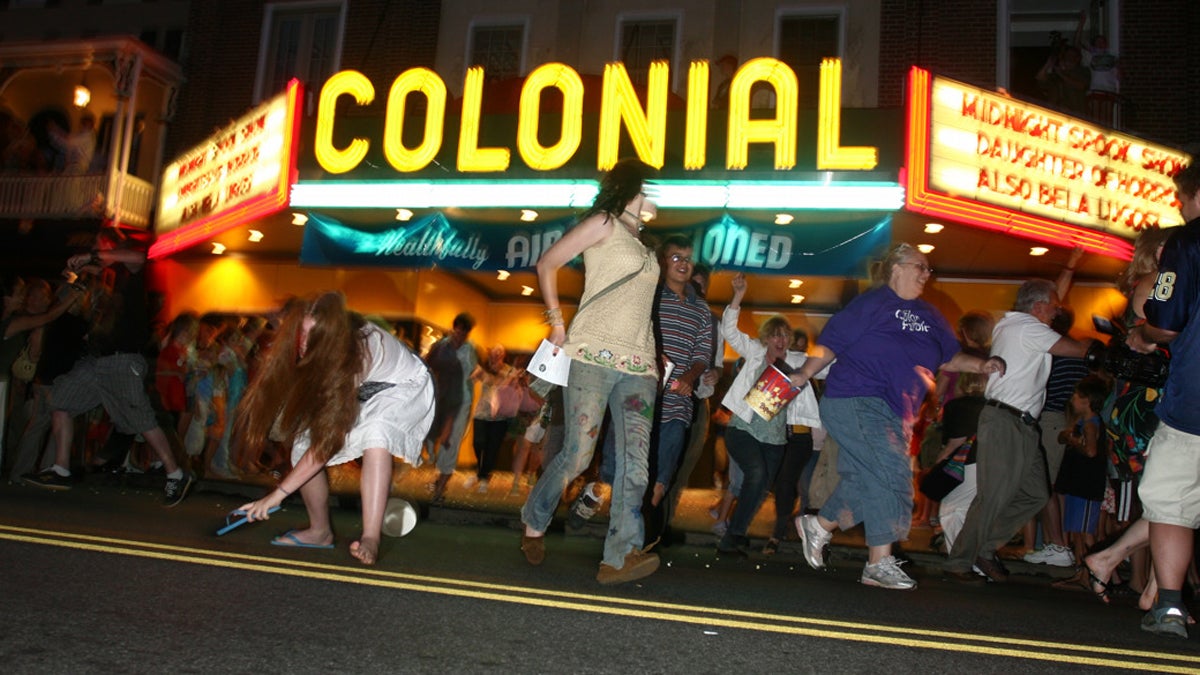Mary Foote on parking, artist relocation, and pedestrian walkways

Participants in the annual Blobfest festival run screaming from the Colonial Theatre in Phoenixville, Pa. The exodus is a re-enactment of a pivotal scene from the 1958 horror-sci-fi film "The Blob," filmed in and around Phoenixville. “Every theatre across the country needs to find their claim to fame,” says Mary Foote. (AP File Photo/Ted Anthony)
Mary Foote is executive director of the Association for the Colonial Theatre in Phoenixville, Pennsylvania.
“Five Questions with …” is a regular Keystone Crossroads feature where we seek to glean wisdom and ideas from some of Pennsylvania’s top urban thinkers and doers. Mary Foote is executive director of the Association for the Colonial Theatre in Phoenixville, Pennsylvania.
Q: Tell us about an amenity or service that you’ve seen in your travels to other places that you wish you could bring back to your city/community?
A: Great public transportation is such an integral part of downtown revitalization. Unfortunately, Phoenixville has had to move forward without it. This has made for crazy traffic jams and increasing pressure on parking availability. I would love to see an increased commitment to this on the federal and state levels.
Another very interesting effort I have learned about is in Paducah, Kentucky. A town-wide effort encouraged artists to relocate to Paducah with affordable housing incentives. As Phoenixville revitalizes it would be great to find ways to encourage and sustain affordable housing in order to maintain the diverse community that has been an important part of the charm of the town.
Also, One Percent for the Arts is a great way to continue to acknowledge the role of the arts in the revitalization of our communities and to keep the experience growing.
Q. What’s one urban improvement idea that you could categorize as “nice try but didn’t work”?
A: I used to think closing streets for pedestrian walkways was a mistake, until I visited Times Square! We have too long let cars drive our thinking in downtown revitalization. I think the lesson here is to think about what you are trying to create in your downtown and work from there. Pedestrian-friendly shopping areas may work for you or not, but the key is to not let outside forces determine your thinking.
Q: Describe a person in your community who is a “spark” — someone who seems to get things done and inspire people. (This does not need to be an elected official.)
A: Richard A. Kunsch, Sr. Dick is the CEO of Phoenixville Federal Bank and Trust and a life-long resident of Phoenixville. Dick has seen the downtown through some hard times but has been on the cusp of the revitalization. Dick is always open to new ideas, has this innate ability to bring people together and has a true appreciation for the town he grew up in. He has served on many boards and provided the leadership to many of them in crucial moments. Currently he is on the board of the Association for the Colonial Theatre (ACT) and on the campaign team planning for the theatre’s planned expansion.
Q: What flaw or habit does your city/community have that you would like to see change?
A: I have to admit, I find this community to be extremely positive and game to try anything. But parking can bring out the worst in some. Sometimes the attitude is that if the parking spot is not right in front of the store you are planning to patronize then there must be a parking problem. Our signage for parking is an issue for sure and that is being addressed and busy nights can put stress on available parking, but Phoenixville is a great little walkable community. I say find a parking lot a couple blocks away from the center and take a nice walk, check out the stores you pass and enjoy the ambience.
Q: Tell us about a movie or book that depicts, in a way that grabbed your attention, how a city can thrive or fail.
A: Saul Alinsky was my introduction to thinking about community and addressing the issues that face neighborhoods in general. Later, “The Backyard Revolution” by Harry Boyte and Save our Land, Save Our Towns by Thomas Hylton. Both look at the work that can be done in different ways.
Ultimately, identifying assets and celebrating those pieces of your community while also trying to address the issues helps keep the process as positive as possible. No one wants to spend time just “fighting city hall”, even though you sometimes have to do that too. We’ve been lucky in Phoenixville, our political leadership and their staff are on board with the progress.
Is there someone you know who thinks hard about cities and knows how to get things done? Someone whom Keystone Crossroads should spend “Five Questions with …” Please let us know in the comment sections below or via Facebook or Twitter @Pacrossroads.
WHYY is your source for fact-based, in-depth journalism and information. As a nonprofit organization, we rely on financial support from readers like you. Please give today.



